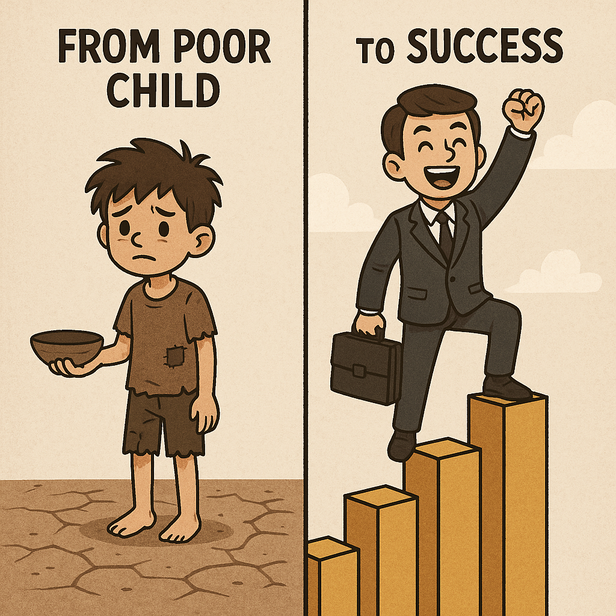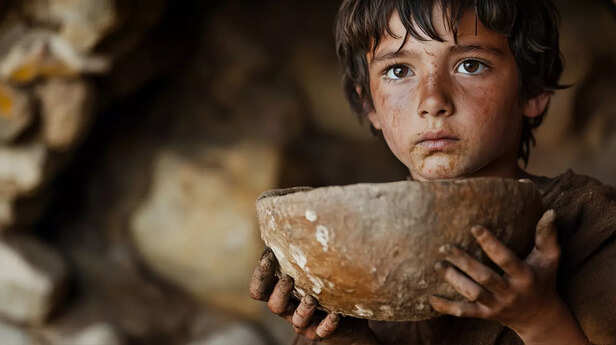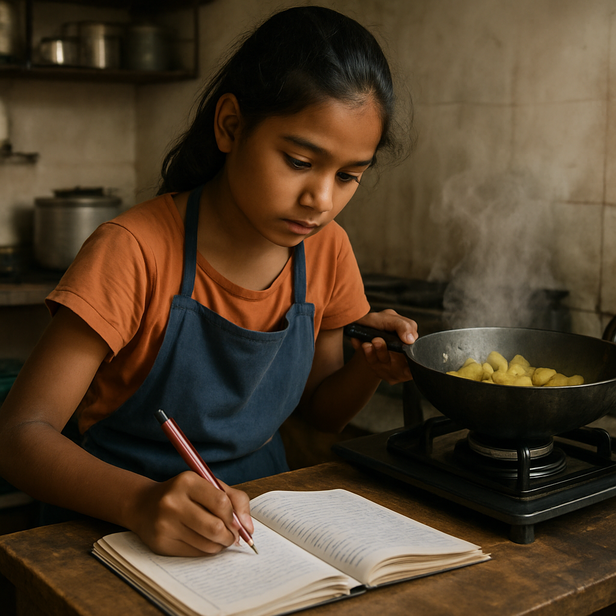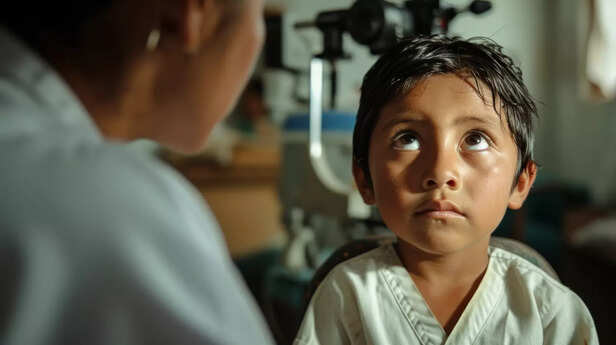How Kids With Nothing Turn Pain Into Unstoppable Power
Noopur Kumari | Jul 01, 2025, 09:00 IST
children from struggling families top exams
( Image credit : Freepik )
Why do kids with torn shoes and no internet top IITs, UPSC, and Olympiads, while those with every resource lose focus? What secret power lies in their pain, their hunger, their silence? This isn’t just a story of success—it’s a wake-up call. Discover the raw, real truth behind why those with less often end up achieving so much more.
We’ve all seen those headlines—“Rickshaw puller’s son cracks NEET,” “Farmer’s daughter tops UPSC.” For a moment, we pause. There’s awe, maybe even a lump in the throat. And then comes the question: How? No fancy gadgets, no silent study rooms, no expensive coaching. Sometimes, not even enough food. Still, they rise. Not because they have more, but because they’ve turned their pain into purpose. And that makes all the difference.

When you grow up in struggle, success isn’t a dream—it’s your only escape. A child who’s watched their mother sleep hungry so they can eat, or seen their father come home with blistered hands after a full day’s labour, doesn’t open books casually. They carry their family’s hopes in every word they read. For them, studying isn’t an ambition. It’s survival. There’s no backup plan. Just a quiet fire that says, I have to make it.

Children from financially stable backgrounds often grow up with gadgets, weekend getaways, and endless distractions. However, for kids in low-income homes, life is harsh and raw. No Netflix. No endless scrolling. Just books and a dream. Their environment, instead of being filled with noise, becomes a silent classroom. Where there's no distraction, focus becomes natural—and deadly sharp.

Hunger is more than physical. It’s emotional. The hunger to change their family's fate. The hunger to make their parents smile with pride. When they sit down to study, it's not about grades—it's about breaking a generational chain of poverty. This kind of hunger cannot be taught in coaching institutes. It is born in broken homes, and it builds unbreakable minds.

When money is scarce, time becomes gold. Poorer children often have part-time jobs or household responsibilities in addition to their studies. They learn early to make every minute count. There’s no wasting time thinking “Kal padh lenge” (I'll study tomorrow). Their discipline isn't fancy—it’s survival. And that structure, once set, takes them further than raw intelligence ever could.

While privileged kids often wait for external motivation—videos, teachers, or fear of scolding—these kids grow an inner voice. A voice that whispers, “You can’t afford to fail.” They may not have a vision board, but they have a vision etched deep in their heart. That self-motivation, born from life’s rawness, pushes them harder than any tutor ever can.

Children from low-income families are often deeply connected to their parents’ sacrifices. They’ve seen their fathers sleep on construction sites, mothers working as domestic helpers. That gratitude turns into emotional fuel. They feel responsible for lifting the burden off their parents’ shoulders. And that feeling—that sacred pressure—pushes them through the darkest nights.

When money is scarce, time becomes gold. Poorer children often have part-time jobs or household responsibilities in addition to their studies. They learn early to make every minute count. There’s no wasting time thinking “Kal padh lenge” (I'll study tomorrow). Their discipline isn't fancy—it’s survival. And that structure, once set, takes them further than raw intelligence ever could.

Life doesn't wait for them to be “ready.” These kids mature faster. They know the value of hard work, the pain of loss, and the power of silence. While many others are still figuring out their goals, these children are already chasing them. Their emotional intelligence is sharp. Their determination is rock solid. And their resilience? Unshakable.
This isn’t to say every privileged child lacks discipline or every poor child excels. But there’s something undeniably powerful about struggle—it shapes character faster than comfort ever can. The children who rise from poverty don’t just carry books—they carry the dreams of generations. And every step they take forward is not just a win for themselves, but for everyone who ever felt powerless.If you have privilege, use it. But if you don’t, remember—your pain can be your power.Let them laugh at your broken shoes today because someday, they’ll read about your journey in books, wearing the shoes you could only dream of.
Explore the latest trends and tips in Health & Fitness, Travel, Life Hacks, Fashion & Beauty, and Relationships at Times Life!
1. Pain Builds Fire

Child's Success Journey
( Image credit : Times Life Bureau )
When you grow up in struggle, success isn’t a dream—it’s your only escape. A child who’s watched their mother sleep hungry so they can eat, or seen their father come home with blistered hands after a full day’s labour, doesn’t open books casually. They carry their family’s hopes in every word they read. For them, studying isn’t an ambition. It’s survival. There’s no backup plan. Just a quiet fire that says, I have to make it.
2. Distractions Are a Luxury

Gadgets and Privileged Kids
( Image credit : Times Life Bureau )
Children from financially stable backgrounds often grow up with gadgets, weekend getaways, and endless distractions. However, for kids in low-income homes, life is harsh and raw. No Netflix. No endless scrolling. Just books and a dream. Their environment, instead of being filled with noise, becomes a silent classroom. Where there's no distraction, focus becomes natural—and deadly sharp.
3. Hunger Becomes Purpose

Hunger is more than physical. It’s emotional.
( Image credit : Freepik )
Hunger is more than physical. It’s emotional. The hunger to change their family's fate. The hunger to make their parents smile with pride. When they sit down to study, it's not about grades—it's about breaking a generational chain of poverty. This kind of hunger cannot be taught in coaching institutes. It is born in broken homes, and it builds unbreakable minds.
4. They Learn the Value of Every Rupee—and Every Hour

Balancing Work and Study
( Image credit : Times Life Bureau )
When money is scarce, time becomes gold. Poorer children often have part-time jobs or household responsibilities in addition to their studies. They learn early to make every minute count. There’s no wasting time thinking “Kal padh lenge” (I'll study tomorrow). Their discipline isn't fancy—it’s survival. And that structure, once set, takes them further than raw intelligence ever could.
5. Their Motivation Comes from Within

Child from Slum Cracks IIT or UPSC
( Image credit : Freepik )
While privileged kids often wait for external motivation—videos, teachers, or fear of scolding—these kids grow an inner voice. A voice that whispers, “You can’t afford to fail.” They may not have a vision board, but they have a vision etched deep in their heart. That self-motivation, born from life’s rawness, pushes them harder than any tutor ever can.
6. Gratitude Turns into Drive

no-coaching-hardworking-student
( Image credit : Freepik )
Children from low-income families are often deeply connected to their parents’ sacrifices. They’ve seen their fathers sleep on construction sites, mothers working as domestic helpers. That gratitude turns into emotional fuel. They feel responsible for lifting the burden off their parents’ shoulders. And that feeling—that sacred pressure—pushes them through the darkest nights.
7. They Don't Fear Failure—They've Faced Worse

From Darkness to Degrees: The Kids Who Beat the Odds
( Image credit : Freepik )
When money is scarce, time becomes gold. Poorer children often have part-time jobs or household responsibilities in addition to their studies. They learn early to make every minute count. There’s no wasting time thinking “Kal padh lenge” (I'll study tomorrow). Their discipline isn't fancy—it’s survival. And that structure, once set, takes them further than raw intelligence ever could.
8. They Build Mental Muscles Early

“Success Story of Poor Student in India
( Image credit : Freepik )
Life doesn't wait for them to be “ready.” These kids mature faster. They know the value of hard work, the pain of loss, and the power of silence. While many others are still figuring out their goals, these children are already chasing them. Their emotional intelligence is sharp. Their determination is rock solid. And their resilience? Unshakable.
SOMETIMES, LESS IS MORE
Explore the latest trends and tips in Health & Fitness, Travel, Life Hacks, Fashion & Beauty, and Relationships at Times Life!
